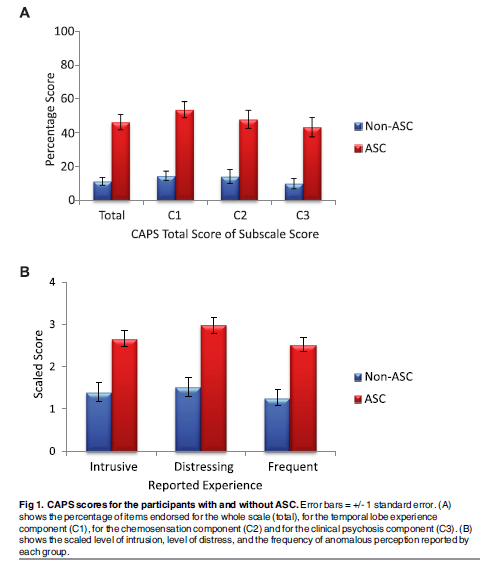Do you ever see shapes, lights, or colours, even though there is nothing really there? These were the type of questions asked of adults with autism spectrum disorder (ASD). A surprising high percentage of ASD adults answered yes to these questions.
We know that autism spectrum disorder (ASD) individuals experience more atypical sensory responses. In this study, researchers investigated anomalous perception, i.e. hallucinatory and/or out of body experiences in ASD adults. A recent study that investigated the extent to which sensory issues are correlated with self-reported autistic traits and found that autistic traits are also related to anomalous perceptual experiences. `Anomalous perception’ is the term given to perceptual and hallucinatory experiences of the type that are commonly associated with psychosis, such as hearing voices, experiencing perceptual distortions, and having `out-of-body’ experiences.
The researchers used the Cardiff Anomalous Perceptions Scale (CAPS). The CAPS is a 32-item questionnaire that asks participants to indicate whether or not they experience a range of anomalous and out of body experiences, and to rate how intrusive and distressing these experiences are.
Using this scale (CAPS) they found that individuals with autism reported three times more of these unusual experiences than typical people. For example, they found that 63 percent of ASD adults answered yes to the question: “Do you ever feel that someone is touching you, but when you look, nobody is there?” compared with only 7 percent of typical adults. Similarly, 47 percent of ASD adults answered yes to the question: “Do you ever see shapes, lights or colors even though there is nothing really there?” compared with 14 percent of typical adults.
Other questions focused on strange or distorted perceptions, such as “Do you ever experience unusual burning sensations or other strange feelings in or on your body?” and “Do you ever hear your own thoughts spoken aloud in your head, so that someone near might be able to hear them?” Three times more adults with autism than typical adults responded yes to both of these questions, indicating that the finding doesn’t just reflect more sensitive perception.
The total CAPS score was significantly higher in ASD adults than those without ASD. Also, the frequency of anomalous perception, the level of distraction and the level of distress associated with the experience was significantly increased in ASD adults. Importantly, both the frequency of anomalous perceptual experiences and the level of distress caused by anomalous perception in this sample of ASD adults were very similar to that reported previously in a sample of non-autistic participants who were being treated in hospital for a current psychotic episode.

Although we know that ASD individuals experience increased sensitivity to noise and visual stimuli, hallucinatory-type experiences in autism is a new and important finding. We know that other conditions like migraine, epilepsy and schizophrenia are associated with hallucinations and strange perceptions, and there is an overlap with ASD.
Some more recent work has also shown an association between bullying and social isolation with hallucinations. It is not unusual for many ASD individuals to have been affected by bullying and social isolation. These negative events may contribute to the development of unusual perceptions.
It is also an important finding that these experiences are much more distressing in ASD individuals. In future consideration needs to be given as to what can be done to limit this distress. Medical professionals need to be educated to ask ASD individuals about unusual perceptions. This research suggests that this could be an important area to discuss in the clinic setting, so that ASD individuals can be given help when it happens.
I may add that many ASD individuals as well as those suffering with schizophrenia find that they feel considerably better on a gluten free diet. Recently I wrote an article Nightmares on Gluten Street, of a number of case studies describing hallucinations and psychotic events in individuals while consuming gluten. I do wonder if the results of this study would be different if ASD individuals on a gluten free diet were compared to those on a gluten containing diet? Maybe a simple solution to helping these ASD individuals to overcome the distress that they are feeling in their daily lives.



